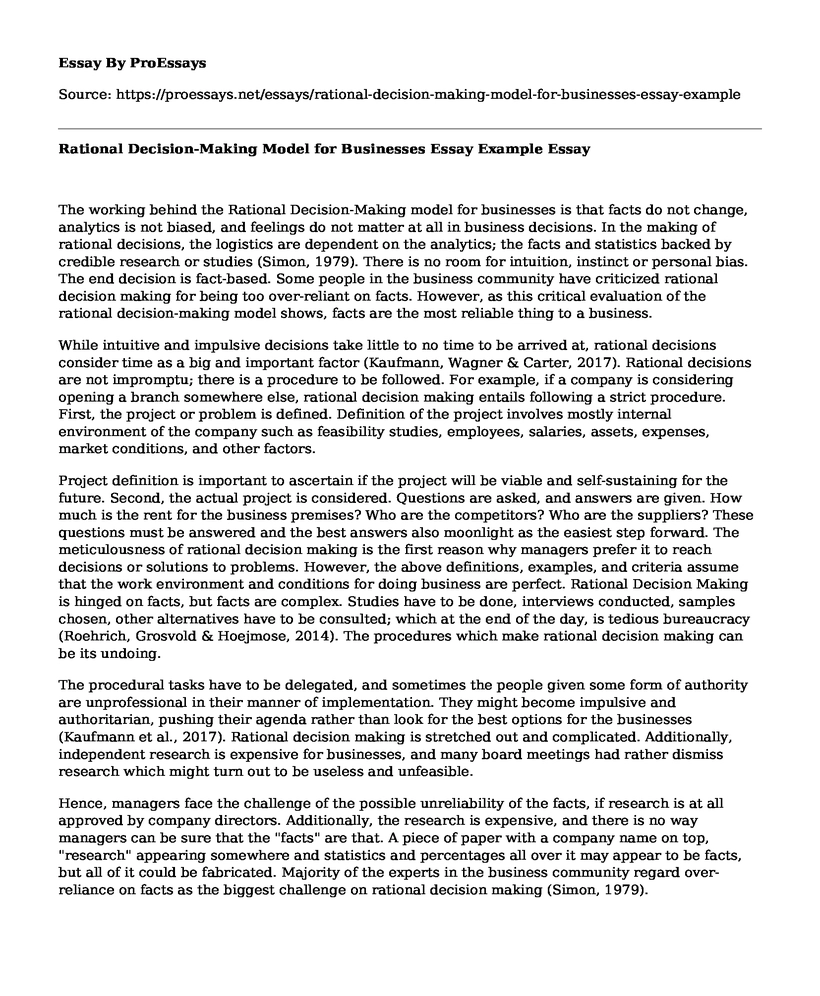The working behind the Rational Decision-Making model for businesses is that facts do not change, analytics is not biased, and feelings do not matter at all in business decisions. In the making of rational decisions, the logistics are dependent on the analytics; the facts and statistics backed by credible research or studies (Simon, 1979). There is no room for intuition, instinct or personal bias. The end decision is fact-based. Some people in the business community have criticized rational decision making for being too over-reliant on facts. However, as this critical evaluation of the rational decision-making model shows, facts are the most reliable thing to a business.
While intuitive and impulsive decisions take little to no time to be arrived at, rational decisions consider time as a big and important factor (Kaufmann, Wagner & Carter, 2017). Rational decisions are not impromptu; there is a procedure to be followed. For example, if a company is considering opening a branch somewhere else, rational decision making entails following a strict procedure. First, the project or problem is defined. Definition of the project involves mostly internal environment of the company such as feasibility studies, employees, salaries, assets, expenses, market conditions, and other factors.
Project definition is important to ascertain if the project will be viable and self-sustaining for the future. Second, the actual project is considered. Questions are asked, and answers are given. How much is the rent for the business premises? Who are the competitors? Who are the suppliers? These questions must be answered and the best answers also moonlight as the easiest step forward. The meticulousness of rational decision making is the first reason why managers prefer it to reach decisions or solutions to problems. However, the above definitions, examples, and criteria assume that the work environment and conditions for doing business are perfect. Rational Decision Making is hinged on facts, but facts are complex. Studies have to be done, interviews conducted, samples chosen, other alternatives have to be consulted; which at the end of the day, is tedious bureaucracy (Roehrich, Grosvold & Hoejmose, 2014). The procedures which make rational decision making can be its undoing.
The procedural tasks have to be delegated, and sometimes the people given some form of authority are unprofessional in their manner of implementation. They might become impulsive and authoritarian, pushing their agenda rather than look for the best options for the businesses (Kaufmann et al., 2017). Rational decision making is stretched out and complicated. Additionally, independent research is expensive for businesses, and many board meetings had rather dismiss research which might turn out to be useless and unfeasible.
Hence, managers face the challenge of the possible unreliability of the facts, if research is at all approved by company directors. Additionally, the research is expensive, and there is no way managers can be sure that the "facts" are that. A piece of paper with a company name on top, "research" appearing somewhere and statistics and percentages all over it may appear to be facts, but all of it could be fabricated. Majority of the experts in the business community regard over-reliance on facts as the biggest challenge on rational decision making (Simon, 1979).
Conclusion
In the end, the final decision is made by the manager. He or she might disregard the facts, for one reason or another and that is another disadvantage of rational decision making. The manager has the last say. Procedures and bureaucratic systems, while useful for the making of rational decisions in business, can also be overly complex and unnecessary. Rational decisions may be said that they are only rational to the extent that the participants (manager, board, employers, researchers, third-party affiliates and so on) adhere to the rules of conduct and ethics.
References
Kaufmann, L., Wagner, C. M., & Carter, C. R. (2017). Individual Modes and Patterns of Rational and Intuitive Decision-Making by Purchasing Managers. Journal of Purchasing and Supply Management, 23(2), 82-93.
K. Roehrich, J., Grosvold, J., & U. Hoejmose, S. (2014). Reputational Risks and Sustainable Supply Chain Management: Decision Making under Bounded Rationality. International Journal of Operations & Production Management, 34(5), 695-719.
Simon, H. A. (1979). Rational Decision Making in Business Organizations. The American Economic Review, 69(4), 493-513.
Cite this page
Rational Decision-Making Model for Businesses Essay Example. (2022, Aug 30). Retrieved from https://proessays.net/essays/rational-decision-making-model-for-businesses-essay-example
If you are the original author of this essay and no longer wish to have it published on the ProEssays website, please click below to request its removal:
- Proper Planning of Hairdresser Business Essay
- Paper Example on Communication During Project Management
- Essay Sample on Benefits of Organizational Diversity
- Essay Example on Data Security: A Growing Concern in Our Digital World
- Paper Example on Main Character Achieves Success Through Mission Command
- Essay Example on The Threats to Walt Disney: Technology Disruption, Competition, and Piracy
- Paper Example on Understanding Lessons Learned in Project Management: Impact on Future Outcomes







